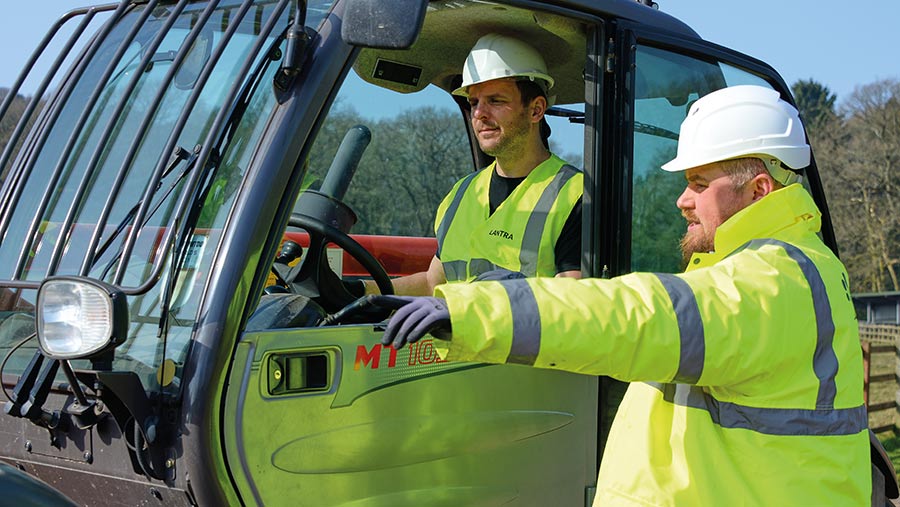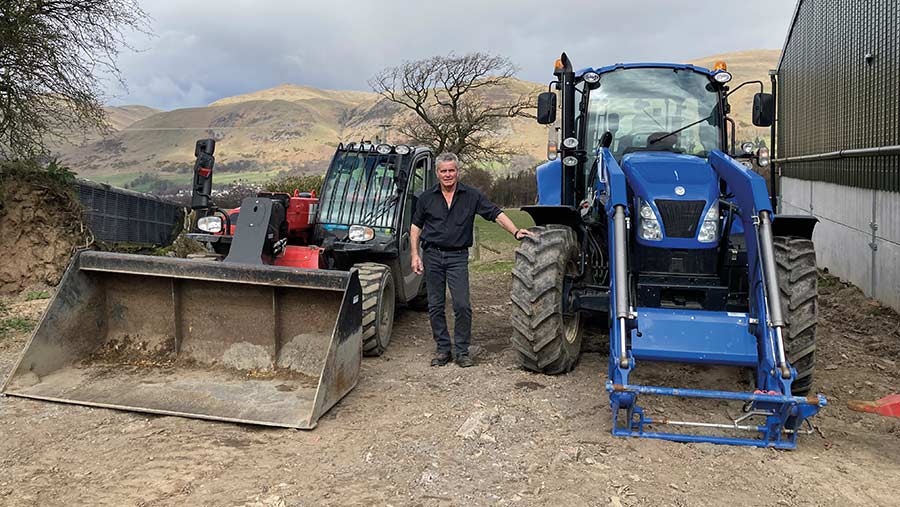Becoming a trainer provides extra income stream for farmers
 © Adam Clarke
© Adam Clarke The squeeze on farm profits has driven the search for alternative incomes. Farmers becoming training instructors is one option that can help provide extra income.
A dire safety record for British agriculture and increasingly strict requirements for staff to have the relevant training certification has led to a demand for quality training instructors from training bodies such as Lantra.
Farmers Weekly visited three land-based industry trainers to see how this unusual sideline can fit with farming and farm work
See also: FW Learning Centre courses for career development and CPD points
Pesticide application and machinery operating
Preventing avoidable accidents was a major driver for Scottish farmer John Eccles (below) becoming a trainer, along with the additional income it provides for his 61ha farm business near Stirling.

© John Eccles
His business is diverse – he runs a specialist poultry breeding unit alongside sheep, cattle, and horses.
Training land-based workers through awarding body Lantra has also been part of his work since 1986, following the passing of the Food and Environment Protection Act which requires operators to gain certification before using pesticides.
Once up and running with pesticide application courses, he drew on other skills learned on the farm to broaden his training offering, which now includes anything from skid-steer loaders, 360 excavators and dumpers, to mobile elevated work platforms.
As a freelance instructor in all these areas, he has the flexibility to fit course delivery around farm duties and bring in a decent income.
“Most people locally think it’s a bit silly, as there would be plenty of work to keep me busy at home if I needed it.
“We need two-and-a-half- to three-and-a-half people to run the business through the year and I see myself as the half. I have two capable long-term workers and want to retain them. The training fits neatly around helping them when I need to.”
One of the most rewarding aspects of his role is helping to improve farm safety, with the importance of changing attitudes towards safe working one of Mr Eccles’s key aims.
Another benefit of being an instructor is getting away from the farm and meeting a diverse range of people.
“Farming can be a lonely job, even when you’ve got employees, so I’ve found it can be good for mental health as well,” he adds.
Driving off-road vehicles
The original plan was a career in primary school teaching, but 31-year-old Hannah Lewis is now showing adults how to operate off-road vehicles on the family farm in North Wales.
Based in Bala, southern Snowdonia, she was approached about running 4×4 courses on the family’s hill farm, where they also have holiday lets and a construction business.

© Hannah Lewis
Not wanting to be tied down with one company, she decided to set up by herself, and operates through Lantra as both a training provider and freelance instructor in off-road driving.
This means she not only provides training for other providers when opportunities arise, but also organises, hosts, and delivers courses herself.
Unlike in the past when trainers could get government funding for gaining relevant paperwork, would-be instructors now have to fund themselves through the relevant courses.
As she was starting from scratch and working multiple jobs to fund courses, it took about 18 months to get all the relevant certification to become an instructor.
These include health and safety, first aid and an adult learning qualification. Lantra then assesses the skills to ensure competence.
In Ms Lewis’s case, she has more than made a return on her investment since she has been running her training business.
“I decided it was for me early on and have enjoyed gaining the qualifications I needed. It’s taken time to earn a reputation and get established, but it’s now working well.”
Confidence is an important element, with courses delivered to complete novices, right up to an experienced operator with 40 years behind the wheel. This is where her background comes in handy.
“I’ve been driving from a young age and dad taught me a lot – how things work, the mechanics and how to drive safely across some of the terrain we have in Snowdonia.
“I was young when I started teaching, so it was tough – especially when challenged by experienced students. But I know my stuff, so always manage to reason with them on the right way to do things.”
For any would-be training instructors, she says the best thing to do is pick topics you are passionate about.
“Don’t go in with the intention of doing a range of things from the start. Gain the right experience in one topic and build from there.
“Also, listen to your students. There is a lot to learn from others’ experience, good or bad, and you can feed that into how you deliver future courses,” says Ms Lewis.
Agriculture and forestry machinery
Sam Jones believes that having the right experience in a particular discipline is key for any training instructor, with his early career giving him a great foundation for his now full-time role delivering land-based skills courses.
While not from a farming background himself, he gained plenty of practical experience on local farms growing up. His first job after leaving education was on a mixed arable unit operating a range of equipment.

© Sam Jones
He then moved through roles with the Sheep Trust and the Red Meat Industry Forum, both farmer-facing roles that honed knowledge transfer skills that would stand him in good stead for a career in training.
Mr Jones helps on a friend’s farm during harvest, keeping skills sharp on modern tractors and telehandlers – two key courses that he offers to farm workers through his training business SCJ Training.
“You need the practical skills to be able to operate the equipment competently and have the credibility to stand up in front of people who are often already experienced themselves.”
Freelance instructors are well supported by Lantra to ensure they are fully prepared prior to teaching their first course.
From starting out 15 years ago offering firearms and chainsaw courses, Mr Jones is now a training provider and instructor for a wide range of agricultural and forestry tasks.
He has also added skills verification for some disciplines and mentoring new instructors into his repertoire.
Skills verification involves a phone call to gauge a candidate’s basic knowledge on a subject. If considered knowledgeable, a meeting for a technical evaluation is then arranged.
“Lantra wants to know the candidate can operate and carry out all the tasks safely on demand – again, it comes back to credibility. Some other organisations only require the right paperwork to go training,” says Mr Jones.
He adds that demand for land-based training is far outstripping supply at present in his area, so urges anyone interested to see if their skill set matches with desirable courses.
“We do need more instructors and age isn’t a factor. Even if you are young, if you are competent enough, you can succeed.”
Lantra-approved instructor – benefits, rates and costs
- Help land-based and associated workers gain and improve key skills
- Help to address the agricultural industry’s safety record
- Work in a subject or skill area you are passionate about
- Work flexibly – fit training around other responsibilities
- Freelance instructor day rates start at £200/day and rise with experience
- Potential to boost income as a training provider and/or skills verifier
- Cost of qualifications is based on existing experience and skills – starting out as an instructor will cost £500-£1,000, depending on certification already held, such as first aid, forklift, telehandler, chainsaw or tractor tickets
- Access to Lantra insurance, training materials, workbooks and CPD training
Lantra training in numbers
- 500+ Lantra training providers
- 350+ Specialist land-based courses
- 500 Freelance instructors
- 100,000+ students each year
